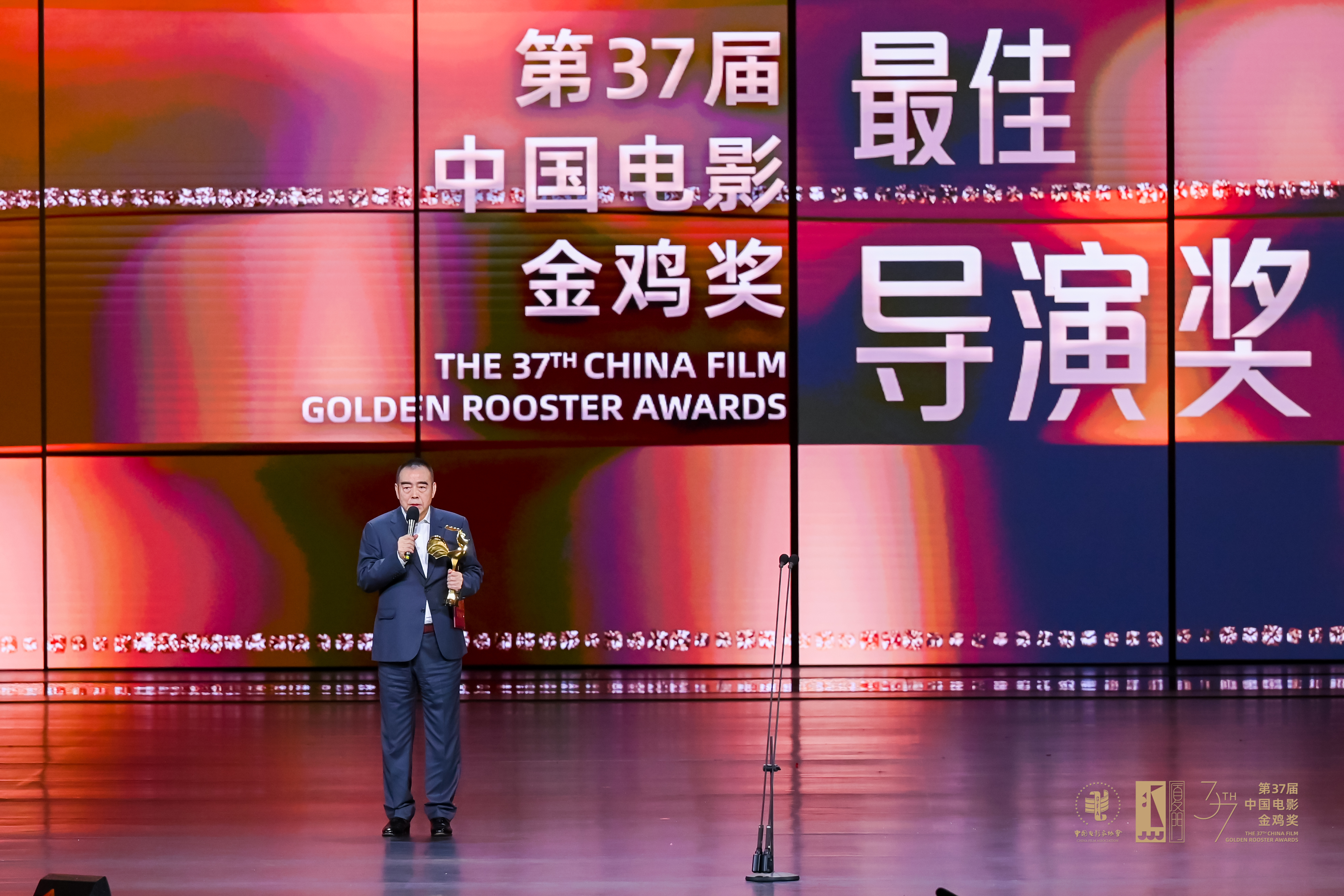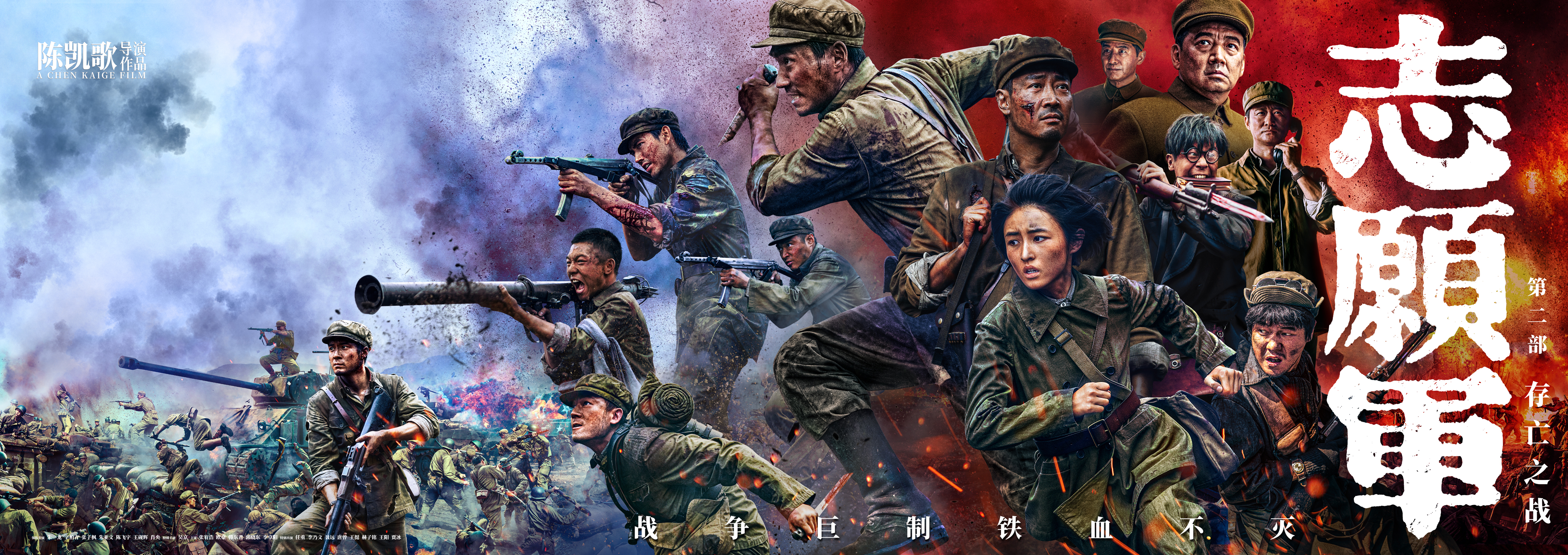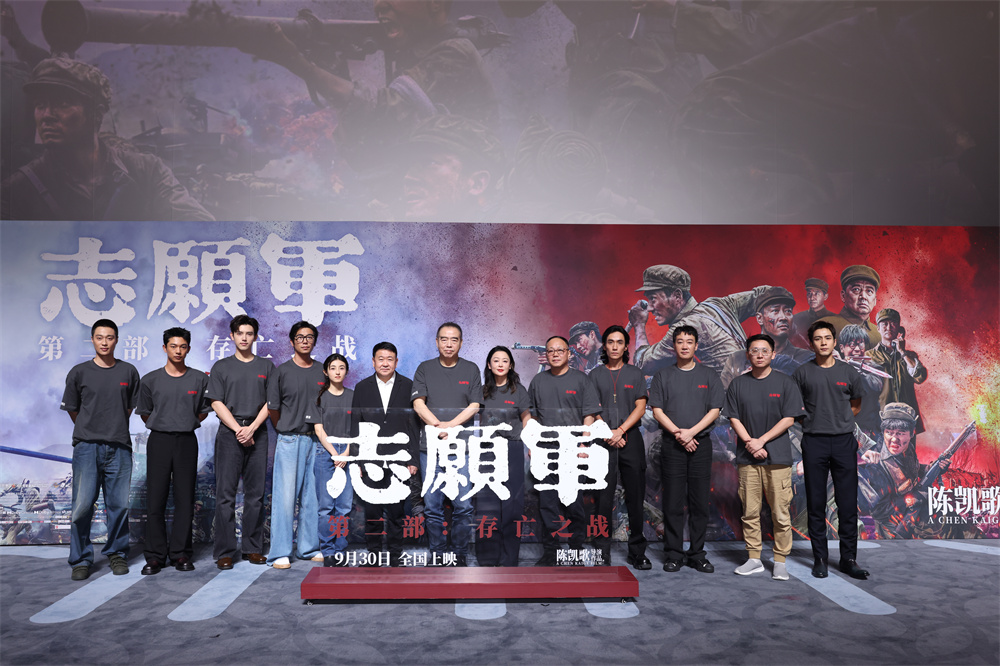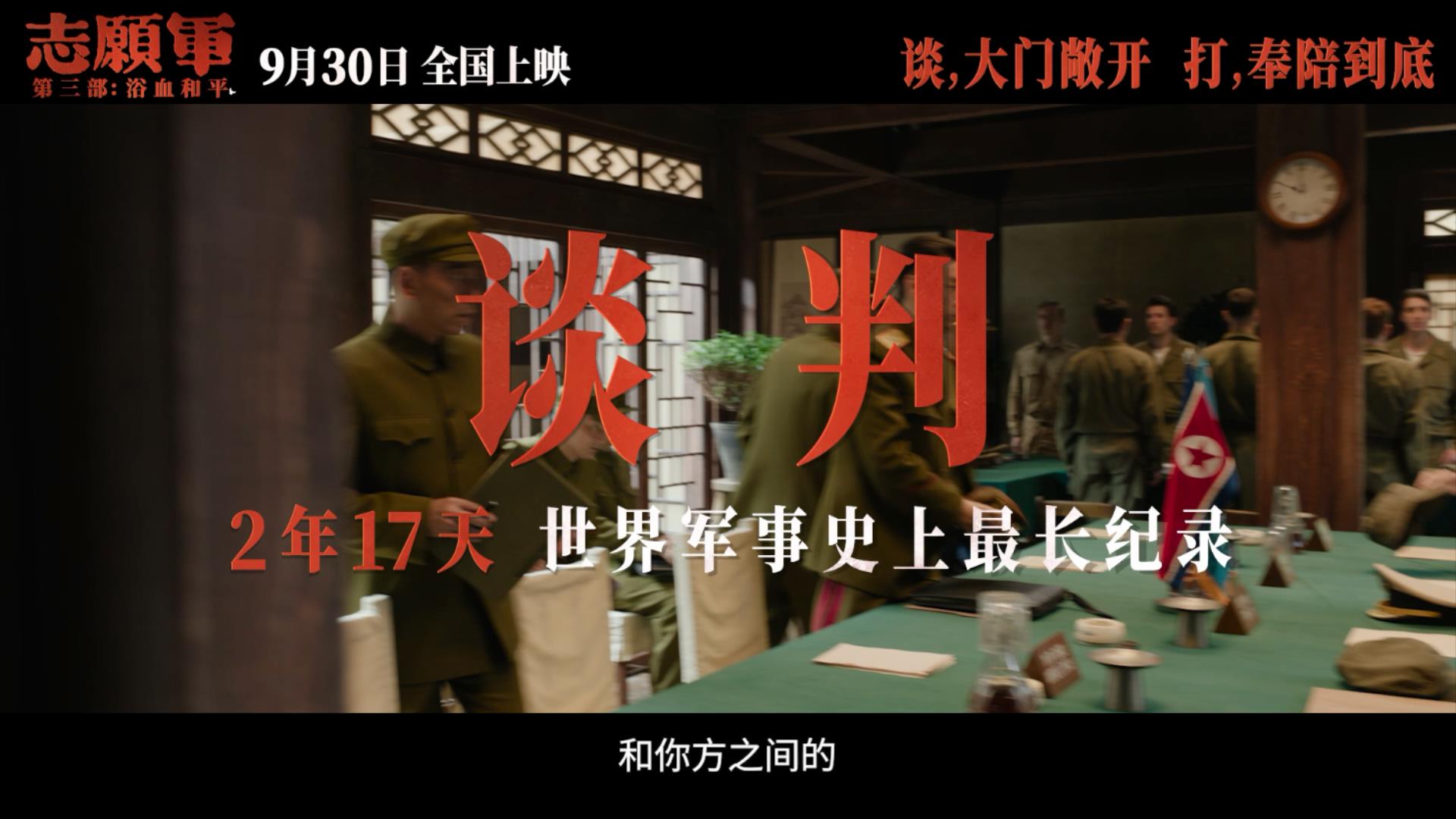
On September 27th, the National Day war epic "Volunteers: Bloody Peace" held its premiere at the China Film International Cinema (Party History Museum CINITY Cinema) in Beijing. Director and screenwriter Chen Kaige, producer and executive producer Chen Hong, screenwriter Zhang Ke, and leading actors Zhang Zifeng (playing Li Xiao, an English translator), Song Jia (playing Lin Yueming, the translation team leader), Zhu Yawen (playing Wu Benzheng, a military expert), Guo Tao (playing Li Kenong), Chen Feiyu (playing Sun Xing, a volunteer soldier), Peng Yuchang (playing Yao Qingxiang, a Chinese military police officer in the neutral negotiation zone), and Zhou Zhengjie (playing Huang Jiguang) gathered to share their filming experiences and highlights.

As the final installment in the "Volunteer Army" trilogy, "Volunteer Army: Bloody Peace" aims to unlock a new "fight-versus-negotiation" scenario, allowing viewers to witness a more multifaceted game of strategy and competition. After five desperate battles, the heroic Volunteer Army forced the US military to the negotiating table. Once the negotiations began, the confrontation between the two sides intensified and became increasingly intense. Faced with repeated provocations from the enemy, the Chinese delegation refused to yield, defending their bottom line with professional expertise and unwavering resolve: "Talk, the door is open! Fight, we'll fight to the bitter end!"

movie posters
It's worth mentioning that just one day before the film's premiere, the jury announced the nominations for the 38th China Golden Rooster Awards. "Volunteers: Battle of Survival" (released during the 2024 National Day holiday) received seven nominations, including Best Feature Film and Best Actor.
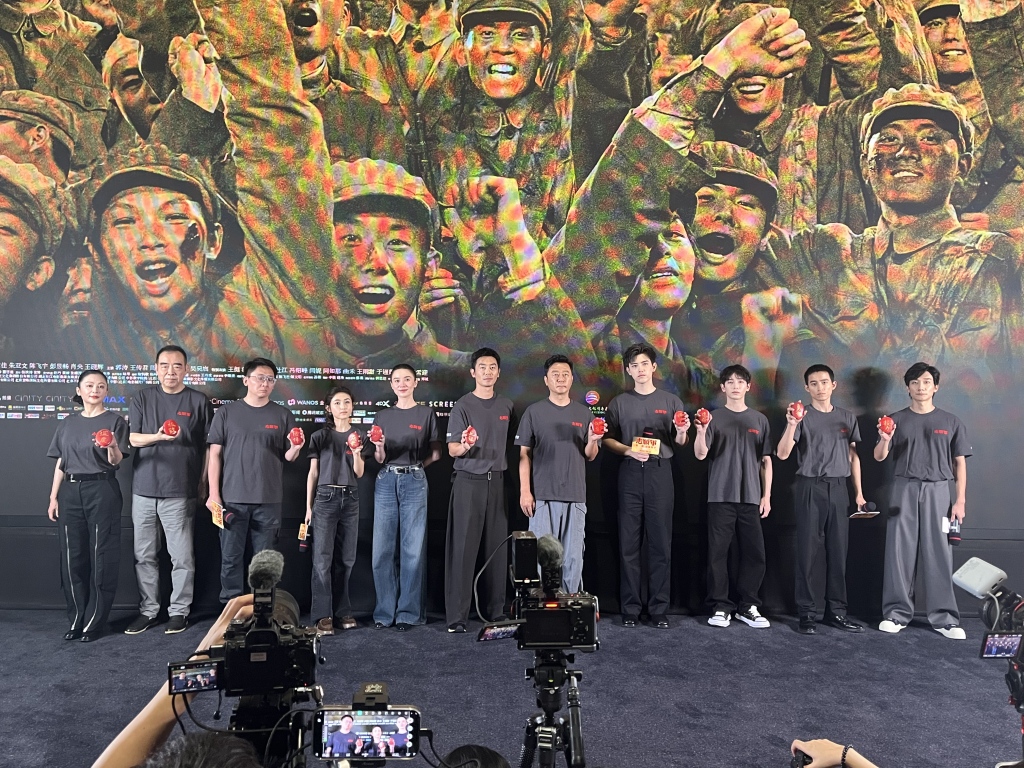
At the premiere, the main creators took a group photo holding the key prop "Red Pigeon Eye Stone" in the film. Photo by Wang Zheng, a reporter from The Paper
"How many five-year periods can a person have in their lifetime? The scriptwriting of the Volunteer Army trilogy took two years. After 521 days of filming, we shot more than 11,600 shots, more than 7,700 special effects shots, assembled more than 3,000 people, and put more than 500 vehicles into use... If I were to talk about these, I could talk for a long time... But these numbers are cold. I personally think that the truly valuable and heartwarming numbers are the figures of the Volunteer Army's Third Company on Songgufeng. After a battle, only 7 of more than 130 soldiers survived; and the figures of Yao Qingxiang who was shot through the head by an enemy spy from one centimeter away - he could have fought back. , yet willingly sacrificed his life for the greater good of the negotiations... These figures are truly heartwarming, and the stories of people are truly valuable." Chen Kaige remarked on the scene, "Time flies by, but I feel it was worth it, because I might not get the chance to make a film like this again in the future. So, during filming, we constantly kept in mind the importance of portraying the ordinary people of war. These ordinary warriors—named heroes—are certainly great, but the countless unknown sacrifices, whose unparalleled bravery and fearlessness should also not be forgotten."

Movie promotional video photos
"In the first two films, we mainly portrayed wars and accumulated a lot of experience. However, the difficulty in filming 'Volunteers: Bloody Peace' lies in presenting the 'literary drama' of negotiations. The Chinese and American sides sat at opposite sides of the table to discuss peace, which was really difficult to shoot. Zhang Ke and I still had to start from historical facts. For example, when the US military liaison officer came to the negotiation site, he spoke Chinese and had some understanding of Chinese culture. He asked that the seats of the Chinese and American sides be swapped on the spot. As the saying goes, 'sitting north facing south' is respectful, and we of course argued for it." Chen Kaige said: "Such a scene actually happened in history. Isn't it also a 'war'? For each negotiation scene, we set up multiple cameras on the scene to capture the subtle expressions of the negotiators on both sides."
Pigeon's Eye Stone is one of the key props in the movie
A reporter from The Paper noted that a red pigeon-eye stone was a key prop in the film "The Volunteers: Bloody Peace." To welcome the arrival of US negotiators and demonstrate Chinese sincerity, the Volunteer Army negotiation team had previously arranged a peace dove and the word "WELCOME" with stones at the negotiation site. The red stone was the finishing touch to the dove and can also be seen as the director's own creative expression (Chen Kaige's original name was Chen Ai-ge). At the premiere, each of the film's main cast members received a red pigeon-eye stone and used it to interpret their individual roles and share their thoughts on participating in the film's creation.
The pigeon-eye stone Chen Kaige received had the word "Extreme" written on it. He said, "I understand its meaning perfectly!"
The stone Zhang Ke received had the word "accompany" written on it. "In 2023, I was invited to the Shenyang reception for the tenth batch of remains of the Volunteer Army soldiers returning home. This year, actor Zhu Yilong, who played Volunteer Army battalion instructor Li Xiang in the trilogy, was also present at the reception for the twelfth batch of remains. This is all a form of 'accompany.' I suggest that everyone, if you have time, leave the theater and visit the Volunteer Army Martyrs Cemetery in Shenyang to sweep the graves of the heroes buried there. There are also many surviving Volunteer Army veterans across the country, and we can all do our best to accompany them. This kind of companionship is our best tribute to them."

The negotiation table, volunteer army uniforms, etc. were displayed at the Beijing premiere. Photo by Wang Zheng, a reporter from The Paper
The stone Song Jia received had the word "Believe" written on it. "My character, Lin Yueming, relied on her unwavering perseverance to participate in the negotiations despite being ill, because she firmly believed that peace would come. This was the power of her faith. Through this filming, I gained a deeper understanding and respect for life and peace."
The stone Chen Feiyu received was inscribed with the word "Defend." "This word is perfectly embodied in Sun Xing. As a volunteer soldier fighting on the front lines, he gave his all, fighting to the very end... I believe he defended the dignity of Chinese soldiers and the bottom line of the Chinese people. In the first two parts of the trilogy, Sun Xing witnessed his comrades fall one by one. He was filled with a burning anger towards the invaders and a resentment for all he had lost. This is why he ultimately chose to stand outside the cordon of the neutral zone, facing the enemy's provocation, and uttering those resounding words."

Props placed in the display cabinet at the Beijing premiere. Photo by Wang Zheng, The Paper
During the interactive session, when asked why the film featured multiple photographs, Chen Kaige explained, "Photos are our connection to the past. We all have this childhood experience: standing in front of a table, barely taller than the table itself, and seeing photos of you or your family and friends displayed on it. Everything seems frozen in that moment. This is our connection to the past, to the volunteer soldiers who fought so bravely. Photos appear several times in the film, including the humiliating photo of the signing of the Boxer Protocol in 1901, and the final photos of the martyrs displayed on the cabinet in Li Xiao's home. This is both a reflection on the trilogy itself and a tribute to the martyrs who actually sacrificed their lives on the battlefield."
